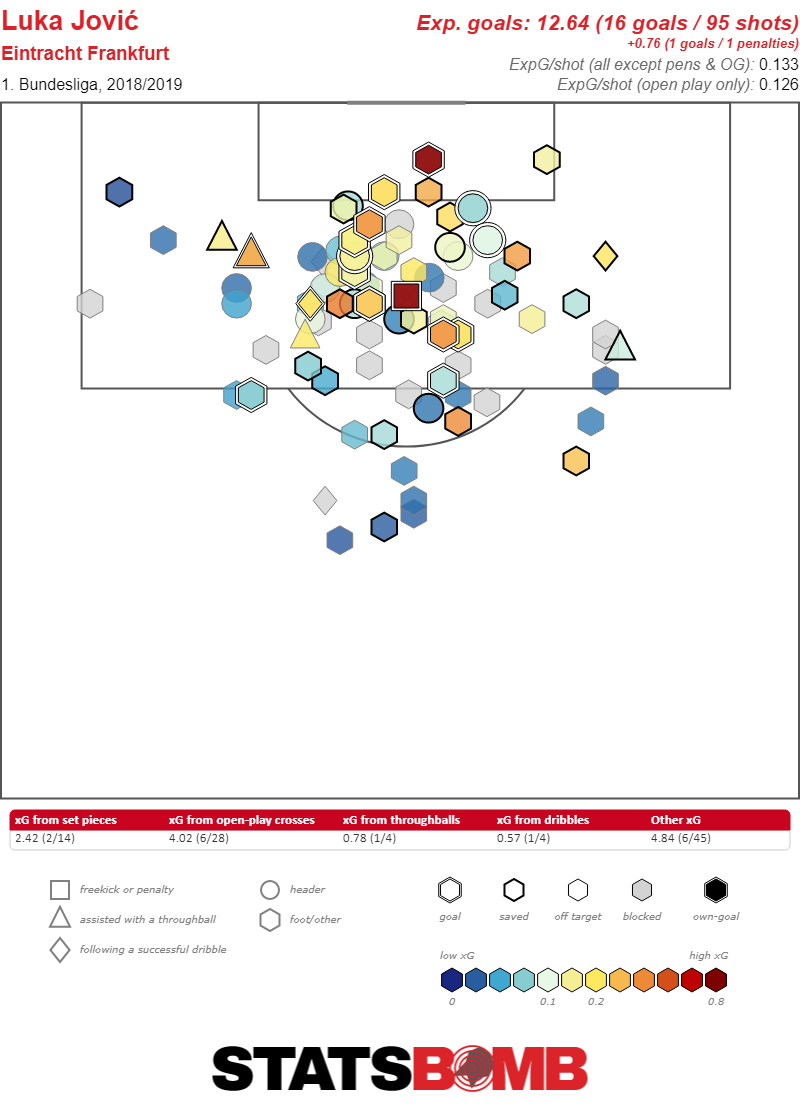Expected goals are in the news again as Man Utd have rocketed back into the top four race under the tutelage of Ole-Gunnar Solskjaer. In the wake of an odds-defying result in the Champions League (they were around 4% to get through v PSG) things looked great, and a defeat in an open game against Arsenal has only slightly reduced the shine on the Norwegian’s halo. To anyone switched on to evaluating football though there is a simple truth: Borne out by both actual analysis and the general feeling of watching the team, during 2019, at times, Man Utd have got the breaks.
What this has done, in part, is create a schism between ideas around Solskjaer’s future. I think it’s straightforward: he has improved results and the basis in which they have been achieved, so points and expected goal accumulation are heading in the right direction. He also gave everyone a fun night by “masterminding” a last minute comeback, something that heralded memories of 20 years ago, when he himself did it before. It’s all very romantic and sweet but even through an analytical prism, I’m not sure what more he could have done in his time at the helm, ergo, give him the job.
This isn’t the only idea though, notable analytics post-match chartist 11tegen11 got a ton of grief for suggesting that as Solskjaer had outperformed metrics and was likely to never have it so good, he should turn down the job if offered. This was a clumsy way of representing the point and clearly a step too far, but the core truth was valid: ahead of the defeat at Arsenal, Solskjaer had been riding the top of the wave. Some that were offended by stats jumped in to the debate too, including ESPN editor Alex Shaw, who opined that:
Just seen someone say Solskjaer may not be the right man because 'United are out performing their xG, long term that will revert.' What a joyless phrase that is.
One person’s joylessness is another’s useful information. Again, to reiterate, Solskjaer has improved Utd, but arguably only to a level that matches their undeniable talent, so in the mix behind Liverpool and Manchester City for the top four. Whether he can take the job on and move them up to the next level--to challenge for the title--is a key point. The gap to bridge is enormous, and will be for anyone. Man Utd still hold many of the same problems they did under Jose Mourinho, yet harbour ambitions of the highest realm. Aspects of the squad are aging and the defence appears to need remedial work, in truth it has done for years. That improvement will be a challenge and with Liverpool and City well bedded in to long term projects, it doesn’t feel like they will be careering back to the pack any time soon.
StatsBomb editor Mike Goodman noted that this round of “xG versus the world” featured a distinctly broader base of invested parties and perhaps that this represented progess. And that’s a healthy move. The stylised nerds against Real Football Men war may well rage on, but an increasing group of younger, engaged fans and people involved with football are interested in any aspect or analysis that broadens out their knowledge. Expected goals are well past the realm of niche outsider chat, for all that it probably hasn’t reached your dad’s mates down at the golf club. The future has arrived, as it tends to.
The essential wins created by following and understanding the numbers are frequently obvious and arrive often: Man Utd were always highly likely to drop back this season, Arsenal’s underlying quality was not very well reflected by their unbeaten start, Dortmund were never away and clear in Germany, Real Madrid are a declining unit full stop. There are further elements that are showing themselves even more recently as both Liverpool and Tottenham’s results quieten down to varying degrees. We can easily understand that both were ballooning over expectation throughout the autumn and early winter:
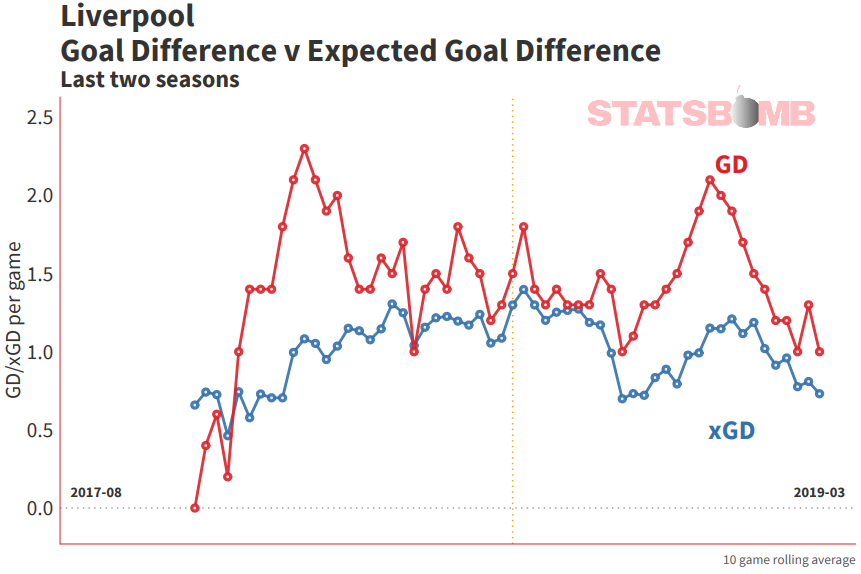
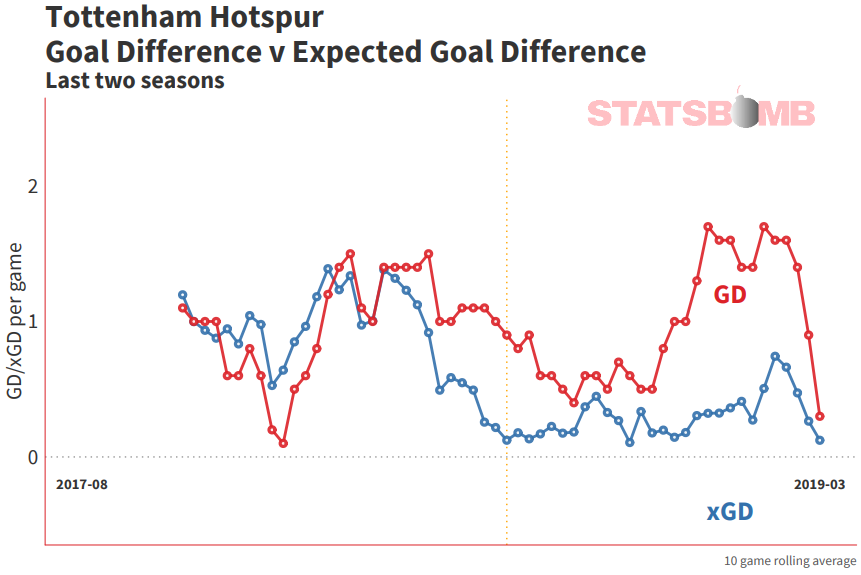
All the narratives exist in the difference between the red (reality) and blue (expectation) lines. However, the blue (xG) line gives us a strong idea of a team’s definable quality and quickly shows us that Liverpool are very good, but also that they were last season. Has the team actually improved? Now that’s hard to say. For Tottenham, the reality is rose-tinted, while expectation shows tangible decline. That they have hit a bumpy patch eventually in this season, feels long overdue, especially given issues around multiple injuries and a lack of squad reinforcement. None of this is to denigrate the enjoyment of the game, and you will find that people who are engaged in this stuff are every bit as interested in the sport as those that aren’t, perhaps moreso.
For players it can be more nuanced: Harry Kane’s shooting flagged him as a Premier League starter quickly, Cristiano Ronaldo’s goal drought during 2017-18 was always going to fade out as long as he was peppering the goal. It can work otherwise too: Marcus Rashford never had the shot volume to match his early goal totals when he broke through in his first season. It’s only now having been empowered into a striking role with an engaged manager in Solskjaer that we have seen his shot and goal volume enter the territory where he is no longer just an attractive attacking prospect, he’s now an attractive goalscoring prospect too.
Rashford’s emergence at such a young age mirrored that of Raheem Sterling. That they were even on the pitch for top clubs at early points in their development was a huge signifier. Sterling’s best season in a pre-Pep Guardiola world was arguably for Liverpool in 2013-14 but how did we really know that he had made the leap into becoming one of the league’s top performers in 2017-18? Clutch goals helped the casual fan notice, as did the sheer volume of goals, but plenty of players have hot scoring streaks. The reason we knew he was now undeniably the real deal was that the goals and creativity were backed up by the expected numbers, so more than likely were sustainable. Between 2016-17 and 2017-18 his expected goal contribution nearly doubledl. That's huge. These rates have continued this season too. The kid grew up and delivered.
Expected goals do help us make solid preliminary evaluations. Luka Jovic has had two goal filled seasons at Eintracht Frankfurt, and he has both good expected numbers and looks to be overshooting expectation:
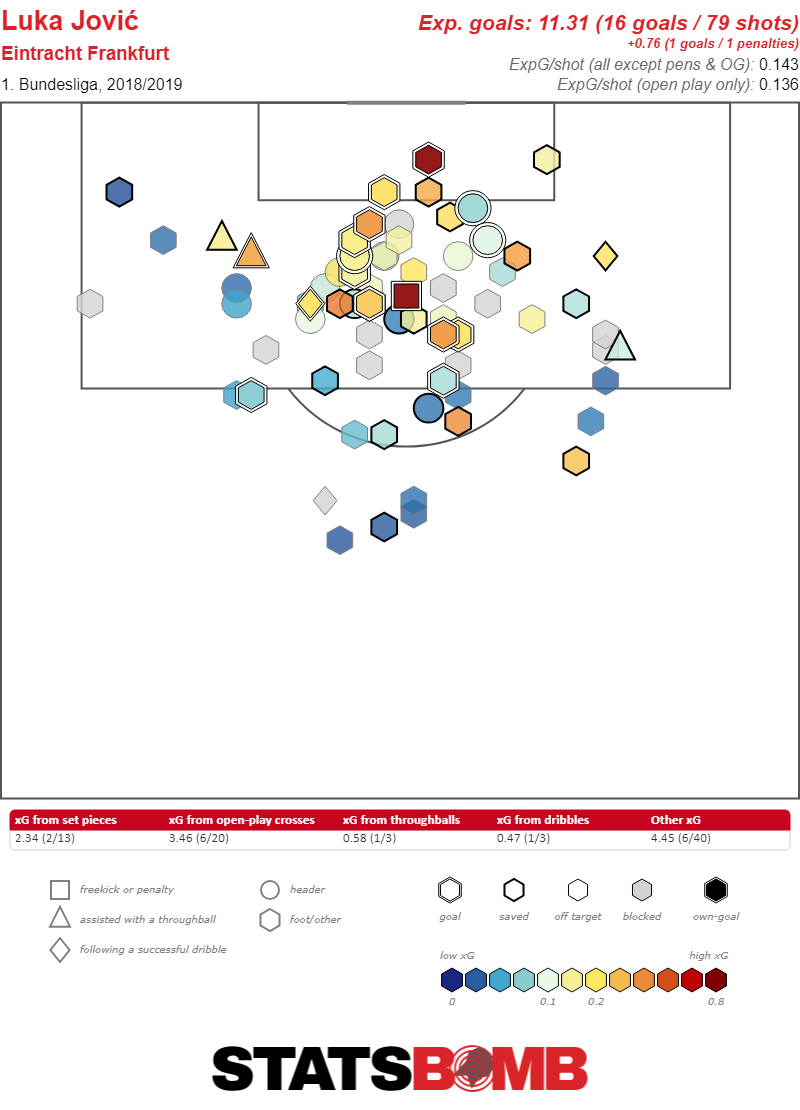
The main point here is not a fear of unsustainable overachievement, but that his expected totals are extremely solid. For a 21 year old to be recording around 0.6 xG per game is a hugely positive indicator and that his goalscoring has landed on the positive side of that is a bonus. It's no wonder he looks to be attracting attention from Europe's top clubs as a versatile scorer who can shoot with either foot or his head, and scores freely.
But he's an obvious pick. Elsewhere, Lille’s Rafael Leão is intriguing. He has seven goals in Ligue 1 this season and at just 19 years old, there's certainly a touch of the Rashfords about his early profile; even moreso when you realise his shot volume (just over two per game) and expected goals (0.30 per 90) are more modest than his outputs (a goal rate of double that).
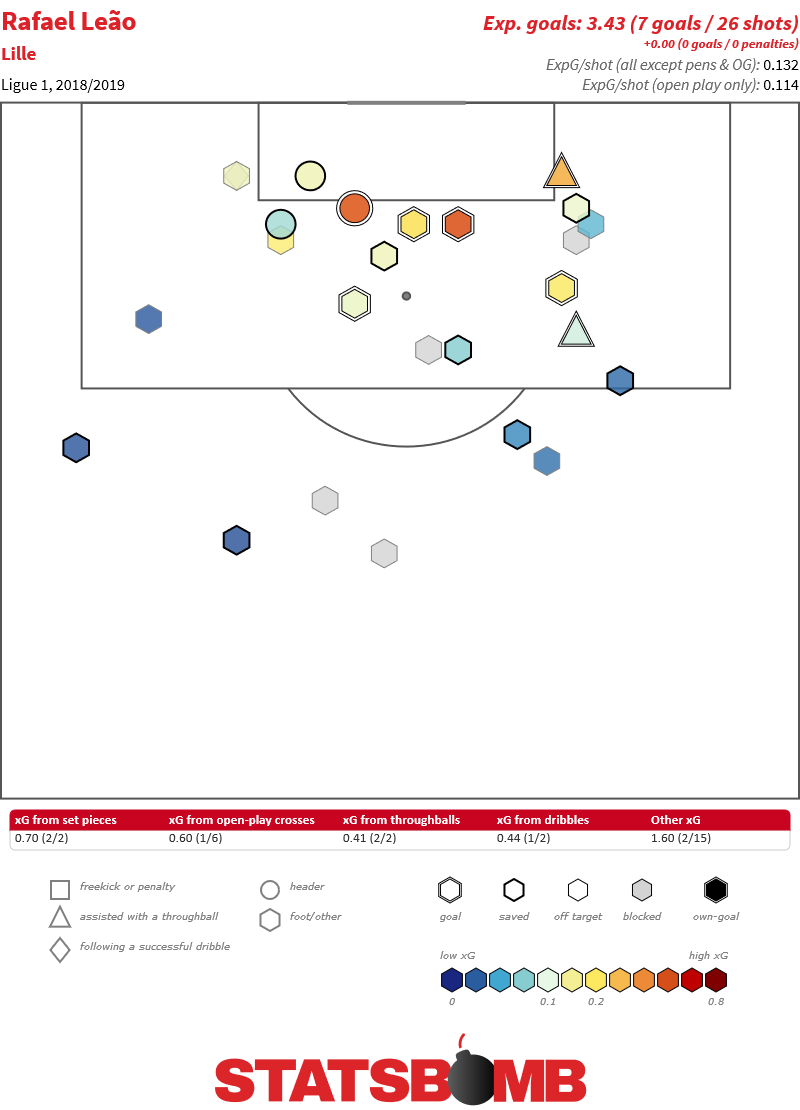
That’s not to denigrate his achievements, and you would certainly look at him as a young talent, but despite the goals, it could be that he is more of an forward prospect than a goalscoring prospect. He has converted most of his decent probability chances and expected goals helps us rationalise the expectation.
Expected goals also showed us Mohamed Salah was likely an elite player when he joined Liverpool rather than the Chelsea wash-out that many idle viewers thought. They backed up that he was having a season for the ages in 2017-18 too on two levels: his rates were superb but also that he was overshooting them. They also helped us understand that he was performing at a fairly similar level this season, and that a more “normal” goal return--which has still been enough to be high in the scoring charts--was more than fine too.
In fact Liverpool’s elite three man strikeforce as a whole are an informative case. Between them taken as a total (obviously they weren’t on the pitch 100% of the time) their expected goals per 90 were a combined 1.28 per 90 minutes in 2017-18 while their actual goal output was 1.73. This season their expected output is basically the same (1.24) while their output is 1.44. Everything around this conversation is elite, but to suggest that they’re less productive because they are exceeding expected goals by less than before fundamentally misunderstands the variable nature of finishing. Different levels of “great” are still great.
I started writing about football analytics in March 2014. Five years on, the uptake has been enormous, and what was once niche has found its way into the mainstream. There still remain challenges to broaden out analysis outside the expected goal framework, and to ensure that the key concepts are understood and not misused, but we have more and better information at our fingertips in 2019, and there is no excuse for the old tropes (“my grandmother could have finished that”) to take precedence any more.
Man Utd should give Solskjaer the job, but they should also give it him with a realistic expectation of what he can achieve in a given timeframe. They have a large upwards gap to traverse and it will take them time even if they get everything right. As one of the world’s wealthiest clubs, they should have a long term strategy to achieve those goals. Now, who is going to decide which players they buy this summer?
